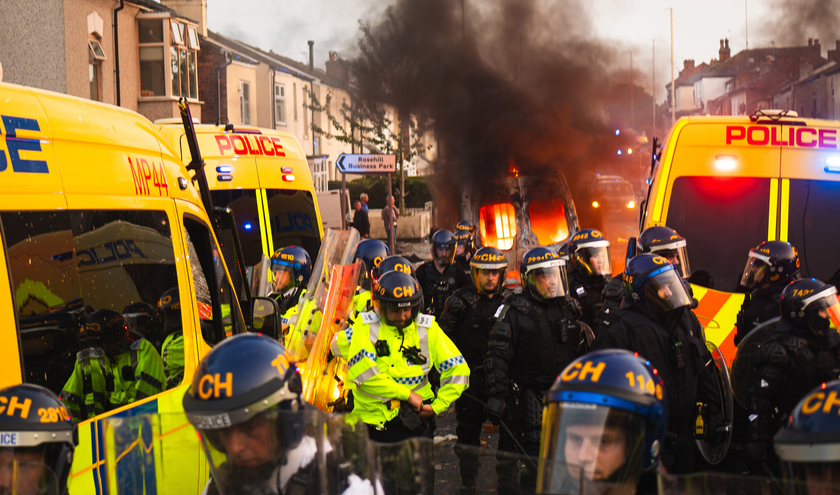After a wave of racism and violence hit many communities throughout England and Northern Ireland, how should local councils and their partners begin to pick up the pieces?
Prime Minister Keir Starmer has so far said the disorder represents a law and order problem. The messaging from central government has not connected the events to underlying social issues.
But could the national focus start to shift towards a look at why anti-immigrant resentment was expressed through thuggery and violence? Seven of the 10 most deprived areas in the UK have experienced rioting, a national newspaper reported last week. A significant proportion of teenagers were among the rioters going through the courts since the protests began, alongside those with existing criminal records, football hooligans and opportunists.
England has been here before. During more than five days in August 2011 around 15,000 people rioted, looted and damaged town centres. In the final report into those events, panel chair Darra Singh said it was ‘clear through our intensive contact with the most challenged communities some families and individuals are under considerable stress'.
He spoke of the need to ‘work with local communities to create a climate of hope in which those who are not resilient enough to copy with these challenges are supported'.
The report emphasised the need to build community resilience, including through public services working together with businesses and providers to strengthen community engagement, build community cohesion, and help provide better services. It also recommended a Family Partnership approach – ‘A partnership of public services to share information, pool resources and fund holistic interventions and address the needs of both individuals and the wider family.'
Could a return to an outcomes-based ‘Total Place' style approach that was tried 17 years ago in 13 local pilots (News analysis, 1 Aug) be one answer to the knotty challenges around resilience, including those linked to the families under most pressure?
In a statement at the weekend after the initial wave of violence, followed by counter protests, chair of the Local Government Association Cllr Louise Gittins said it was ‘with relief that we have not so far seen a repeat of the extremist far-right violence, racism and thuggish behaviour that has brought fear and distress to so many people and blighted communities up and down the country'. But she emphasised ‘it is also critical we act on the longer-term issues of rebuilding and community cohesion'.
Gittins added: ‘Building community cohesion requires a long-term strategic approach, and councils have struggled to fund preventative measures that might make a real difference amid ongoing funding pressures. We also need to see greater investment in young people and funding for diversionary activities for young people who in some incidents appear to be encouraged by older or non-local agitators.'
Councils and combined authorities are playing a key role with the police and other partners to protect communities and speak against hatred and division. Writing in The MJ this week, deputy leader of Plymouth City Council Cllr Jemima Laing said one of the ways councils could combat intolerance was to make it easy to report hate crime and to ‘continue to celebrate and recognise the role of all our diverse communities'.
Many of England's elected mayors are taking a lead in reassuring the public across their regions and welcoming positive community action. For example, mayor of West Yorkshire Tracy Brabin issued a statement of tolerance and unity, with the message that ‘racism and Islamophobia should never be mistaken for patriotism'.
She added: ‘Every child growing up in our region deserves the chance to feel safe and secure. And that absolutely includes those who have had to flee famine or war to come here.'
Head of policy and programmes at the Future Governance Forum Claire Spencer warns in The MJ this week that ‘very soon' all tiers of government must face up to the fact communities are ‘influenceable, dynamic and contains all of the people who have acted on their racism, whether we wish it or not'.
Her view is hard truths need to be confronted by councils, But it also seems clear resilience is not in tatters and remnants remain that can continue to be built on.
Sheffield became the UK's first City of Sanctuary in 2007, with the aim of creating a welcome and safe space for asylum seekers and refugees. The city is only 15 minutes away by car from Rotherham, which has experienced some of the worst of the rioting. Speaking to The MJ, chief operating officer of Sheffield City Council Claire Taylor said: ‘We haven't experienced what Rotherham have experienced, but we're right next door. Obviously, everyone's communities are nervous, but there's an infrastructure ready [here]. You know people are there so you're not relying on the council to do it all. There's some amazing examples of how community groups are offering buddying systems to help people get to appointments if they're anxious to travel alone.'
There is still room for optimism. The last word should come from The MJ columnist Jessica Studdert (Plugged In, 8 Aug). While the new Government is ‘as short on time as it is on money', she believes there is ‘enormous energy and hope out there, frustrated for too long by a disinterested Westminster'. Onwards and upwards.



